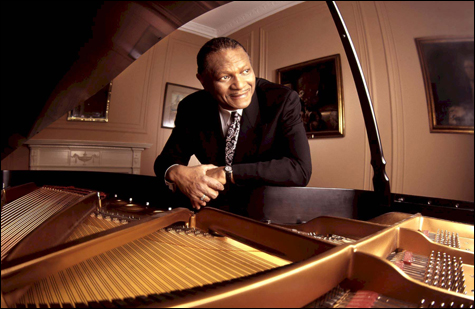
McCoy Tyner
|
In recent years, McCoy Tyner has looked frail for his age — once robust and round-faced, he now appears gaunt. But the long-ago John Coltrane sideman still roars at the piano. On last year’s McCoy Tyner Quartet (McCoy Tyner Music/Half Note), he led a stirring live session with saxophonist Joe Lovano, raining down torrents of notes. At the second set of the opening night of his three-day stand at the Regattabar last Thursday — with special guest trumpeter Christian Scott joining his band — he was just as powerful.
Tyner, now 69, walked slowly to the piano, and sitting behind the instrument — heavy-lidded, unsmiling, courtly, his jaw jutting forward — he was an African-American Don Corleone. But as he unfurled the chords of the opening “Walk Spirit, Talk Spirit,” culminating in an orchestral glissando before cuing in the rest of the band, it was all there. Tyner is known for power and velocity, but he also has an uncommon touch, as distinctive as Hank Jones or Horowitz, a tone as big and well-modulated and full of warm brass as the Count Basie Orchestra. “Walk Spirit, Talk Spirit” rode a Latin-flavored, minor-keyed ostinato, driven by Gerald Cannon’s bass and the hiss-and-tock of Eric Kamau Gravatt’s cymbals and rims. Here and elsewhere, Scott dug into the minor-keyed darkness, and we were suddenly in the outer reaches of classic hard bop.
Tyner’s own playing was mostly chordal — on pieces like Coltrane’s “Mr. P.C.,” he took his big rumbling harmonies to the edges of tonality. But I missed his particular way with speedy single-note runs — his knotty patterns are like no one else’s. There was a bit of it in the solo pieces, where his style reached back beyond Coltrane and hard bop to early swing. There were hints of Earl Hines stride or Tatum-esque-runs in “For All We Know” and “Darn That Dream.” And occasionally those skittering lines snuck through between phrases of the melody — as though there were still too much to get in, too much left to say.